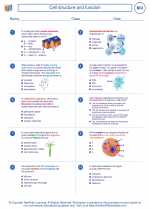Sulfur in Biology
Sulfur is an essential element in biological systems and is a key component of several important molecules in living organisms. It plays a crucial role in the structure and function of proteins, enzymes, and other biomolecules.
Role of Sulfur in Biological Molecules
- Amino Acids: Sulfur is a component of two essential amino acids, cysteine and methionine. These amino acids are building blocks of proteins and are involved in various biological processes.
- Coenzymes: Sulfur is also present in certain coenzymes, such as coenzyme A, which plays a vital role in metabolism.
- Antioxidants: Compounds containing sulfur, such as glutathione, act as antioxidants and help protect cells from damage caused by free radicals.
- Vitamins: Sulfur is a component of some vitamins, including biotin and thiamine, which are important for various metabolic processes.
- Enzymes: Sulfur is found in the active sites of certain enzymes, contributing to their catalytic activity.
Sulfur Cycle
Sulfur is cycled through the environment in a process known as the sulfur cycle. This cycle involves the movement of sulfur through the atmosphere, lithosphere, and hydrosphere, and its transformation into various chemical forms by biological and geological processes.
Study Guide
When studying the topic of sulfur in biology, it's important to focus on the following key points:
- Understand the role of sulfur in biological molecules, including its presence in amino acids, coenzymes, antioxidants, vitamins, and enzymes.
- Learn about the significance of sulfur in protein structure and function, particularly in the formation of disulfide bonds in proteins.
- Explore the sulfur cycle and its importance in maintaining the balance of sulfur in the environment.
- Be familiar with the biochemical pathways involving sulfur-containing compounds, such as the synthesis of cysteine and methionine.
- Consider the implications of sulfur deficiency or excess in biological systems and the potential health effects.
By understanding these key concepts, students can develop a comprehensive understanding of the role of sulfur in biology and its significance in living organisms.
[Sulfur] Related Worksheets and Study Guides:
.◂Biology Worksheets and Study Guides High School. Cell structure and function

 Worksheet/Answer key
Worksheet/Answer key
 Worksheet/Answer key
Worksheet/Answer key
 Vocabulary/Answer key
Vocabulary/Answer key
 Vocabulary/Answer key
Vocabulary/Answer key
 Vocabulary/Answer key
Vocabulary/Answer key
 Vocabulary/Answer key
Vocabulary/Answer key
 Vocabulary/Answer key
Vocabulary/Answer key
